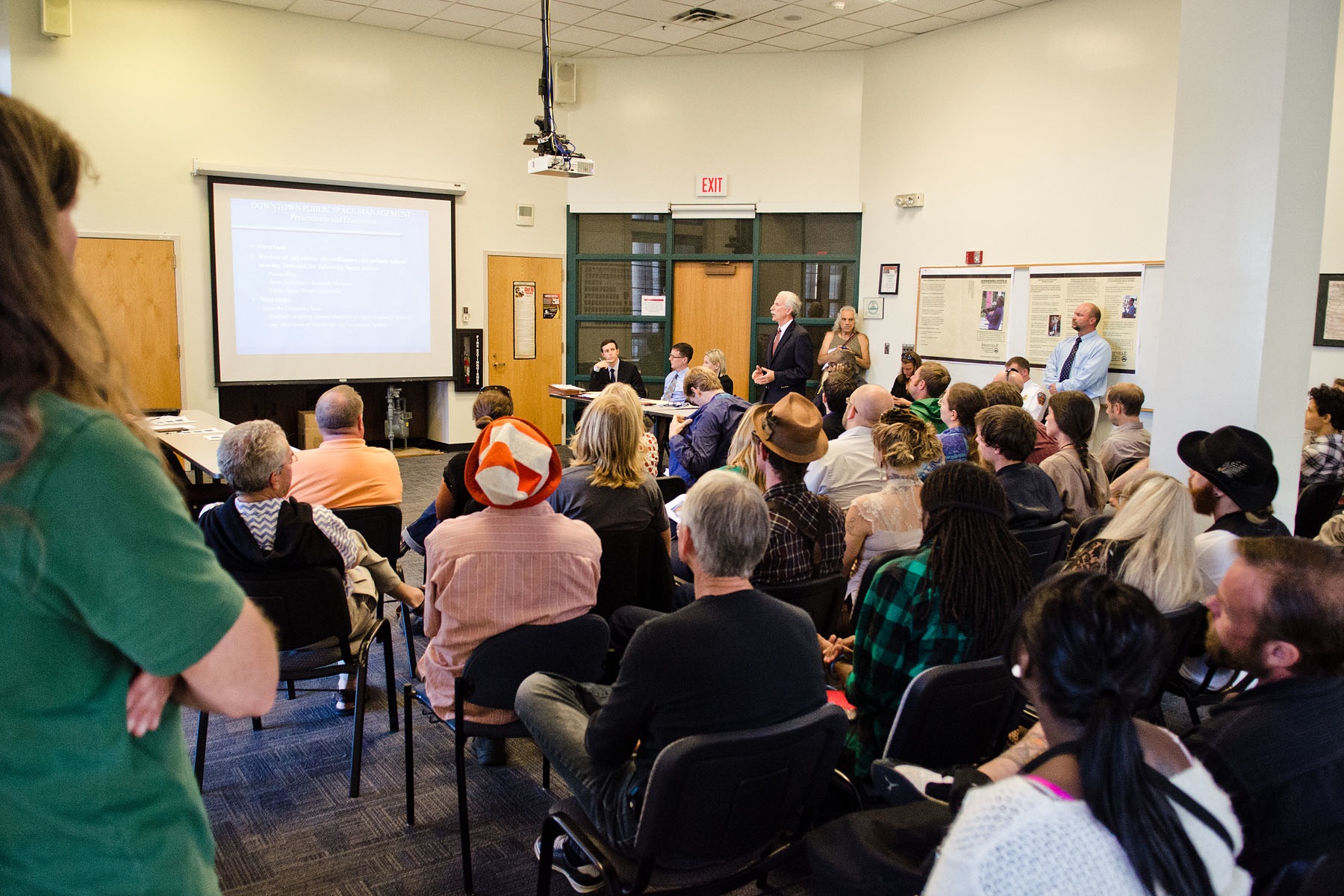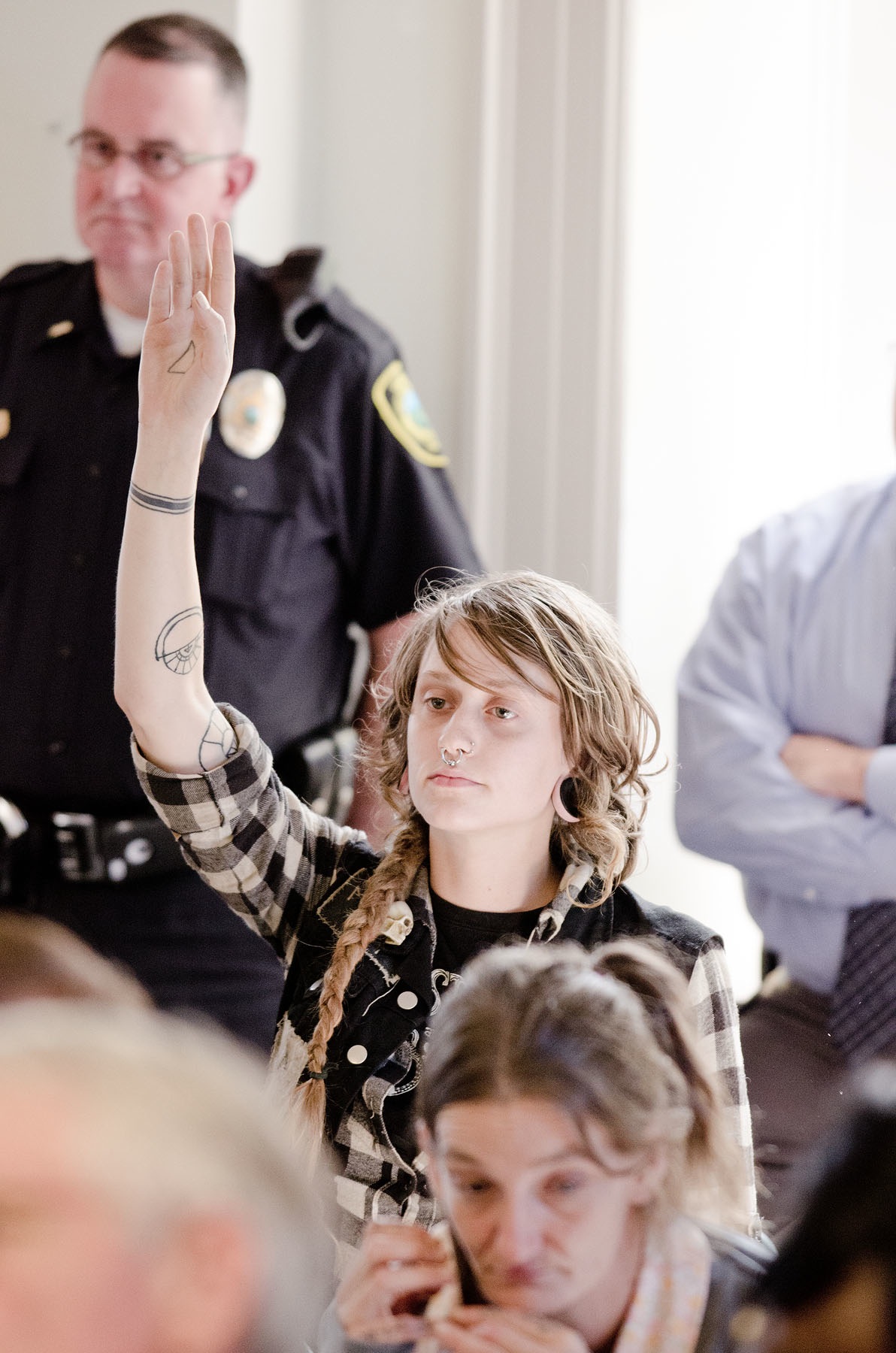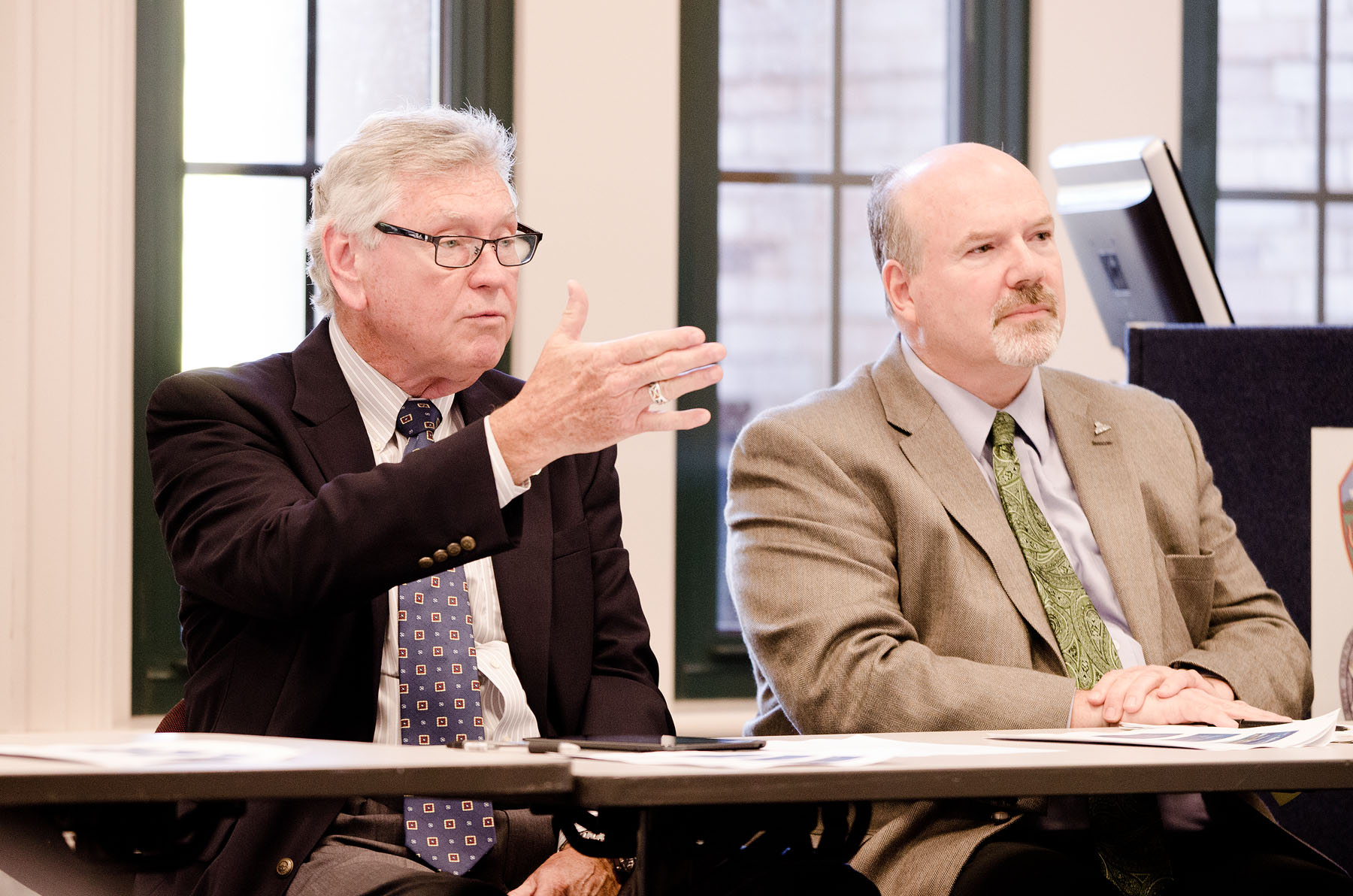


After buskers mobilize against possible restrictions on their art, an Asheville Council committee decides not to pursue new rules further.
Above: buskers fill the room before yesterday’s meeting of Asheville City Council’s Public Safety Committee. Photo by Max Cooper.
Usually, Asheville City Council’s committee meetings don’t see a particularly large public turnout. While open to the public, these monthly afternoon meetings usually include discussion of policy issues before they head to Council or sometimes before a formal proposal is even drafted. While they sometimes play an important role in shaping future changes to the law, it’s usually staff, the committee members, and a few observers at the table.
Yesterday, however, the usual meeting room of the Public Safety Committee was packed with about 60 people. Many of them were buskers, concerned about the possibility of new restrictions on something they view as both livelihood and freedom of speech. Busking is the latest flashpoint in a larger, years-long debate about how to govern public space in downtown.
While city staff have asserted that they had no formal proposals for new rules yet, a larger presentation on “downtown management” did include buskers, and staff had cited some concerns from residents and business owners. Meanwhile, over the summer the downtown police unit commander had suggested and researched a bevy of potential restrictions including a requirement for permits, a ban on amplification and dogs, among others.
It wouldn’t be the first time that such staff suggestions eventually ended up as a city ordinance, and that alarmed some of the city’s many street performers. Last week, they met to discuss the issue and most agreed on opposition to permits or assigned spots. A petition calling for “pro-busker reforms” instead of new restrictions gathered over 1,200 signatures.
At yesterday’s meeting, Assistant City Manager Paul Fetherston presented the options after dealing with the parts of the downtown management policies dealing with panhandling (the city’s planning more enforcement, especially on panhandlers with animals) and vending from sidewalks (it’s currently prohibited, though staff are reviewing the ordinance there as well).
Fetherston noted that the city had researched busking policies in a number of cities, ranging from New York City to Portland, Ore. to Gatlinburg, Tenn.
“I don’t think there were any ‘ah has’ there,” Fetherston said. “We’re going to enforce the ordinance as written…No changes proposed, the police department will continue to exercise its judgement in enforcing those laws.”
While the “next steps” slide of the presentation did list several possible restrictions, including permits and assigned spots for buskers, Fetherston asserted that these were “things for you to consider.” City Manager Gary Jackson also said staff wasn’t proposing any of them yet, but “reviewing key policies” and turning the matter over to Council for discussion.
Council member Cecil Bothwell was absent from the meeting, leaving Council members Chris Pelly and Jan Davis to tackle the issue. Davis, who chairs the committee, noted that “the [busking] ordinance has been pretty good for a number of years.”
He added that the discussion of managing downtown didn’t come up because of buskers and that “most of y’all do a pretty good job of policing yourselves” but that “I’ve had complaints from several merchants” that, for example, the crowds buskers drew sometimes inhibited their business.
Asked by Davis about buskers using amplification, Asheville Police Department Chief William Anderson said they’d received some complaints about amplification, but far more about noise in general.
Sparrow, of the Resonant Rogues, spoke on behalf of many of the buskers, and said that she’d started out over a decade ago as a traveler”with a pack and a dog and a guitar” learning to play her accordion on the streets of Asheville. Busking, for her, provided a path to becoming a professional musician, and it’s something she still sees as culturally vital.
“That’s how I make my living, that’s how I pay my rent, that’s how I’m an active member of society,” she said. “I moved to Asheville in 2003 and immediately fell in love with it because of its vibrant subcultures and artistic community. This is the story I hear over and over again when I listen to people talk about why they’ve moved to — or visited — Asheville.”
Busking, she continued, “is crucial to Asheville’s culture and therefore to its main industy: tourism. Also, Asheville is a notoriously difficult place to book gigs that pay and without busking, many bands would not be able to afford to pass through at all.”
“Instead of new regulations limiting busking, we would like to see policies put into place that are good not only for local buskers, but also traveling buskers,” she concluded, noting that buskers are in the process of forming a group to represent their concerns.
Erin Derham, who directed the documentary Buskin Blues about the city’s street performer scene, cautioned Council that “this is something the community wants” and restrictions, rather than driving out bad buskers in favor of good, usually did the opposite.
“If you take out their ability to make a living, they’ll move onto another city,” she said. “A lot of cities regulate it so they can get rid of ‘the riff-raff’ but that makes it difficult for the successful musicians, so they’ll leave and the bad acts will stay.”
One man took issue with the cities staff had researched, noting that most of them weren’t viewed as good towns for buskers, and hoped they’d take a look at some others as well.
Sadie, who performs with the Carolina Catskins, handed a copy of the petition to Davis and Pelly.

Sadie, a busker who presented a petition for “pro-busker reforms” to Council’s Public Safety Committee, raising her hand at yesterday’s meeting. Photo by Max Cooper.
“The overwhelming voice has come out of tourists, locals and buskers saying that they love busking and would like to see pro-busking legislation versus criminalization,” she said.
“I appreciate your effort, but this has kind of gotten out of hand,” Davis said. “The reason we’re having this conversation is because not everybody is a good act. We get people who light up our emails who are visiting town, or live here, and somebody got mad because they put out a guitar case, somebody got mad because they felt like they were being panhandled. I spend most of my time downtown and there are some times when I’ve been approached, not in a good way.”
“We’re hearing a lot of folks upset at the amount of dog feces on the sidewalk, upset at the amount of clutter,” Davis continued. “I’ll be honest with you, there was a day last week when you couldn’t get through on the sidewalk because of all the people listening to buskers. Those things we have to address.”

Asheville CIty Council members Jan Davis and Chris Pelly during the discussion of busking rules at yesterday’s meeting. Photo by Max Cooper.
But Davis also praised a buskers’ collective to engage with local government “as a fantastic idea” and noted that the city’s current noise ordinance was in need of review. He noted that in the early 2000s, the city had relaxed its old ordinance to be more permissive of busking.
Byron Greiner of the Downtown Association, proposed holding a forum to bring together buskers, residents and business owners to discuss the issue, something the committee members approved of.
Pelly, for his part, praised Derham’s documentary and said “I’ve heard nothing today that rises to the level of Council action.”
With that, it looks like the possibility of new restrictions on the city’s buskers is, for the moment, dead in the water.
—
The Asheville Blade is entirely funded by its readers. If you like our work, support us directly on Patreon. Questions? Comments? Email us.